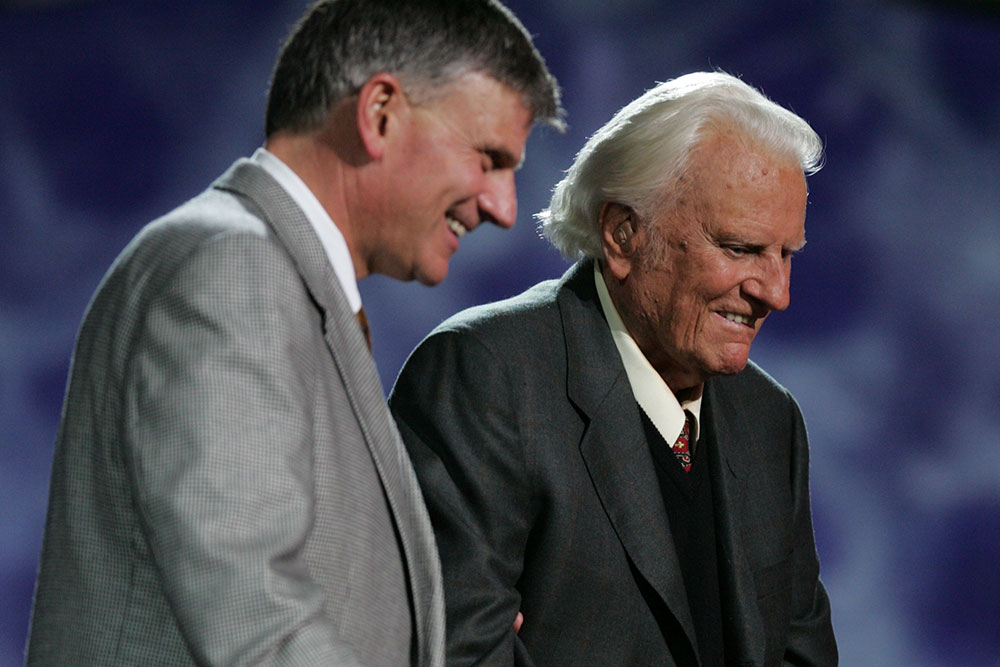Chuck Smith and Billy Graham are two giants of the Christian world who have already gone to their eternal reward.
Interestingly, these prominent pastors play starring background roles in the tale about the origin of Contemporary Christian Music (CCM), a story that is deftly told in the newly released film “The Jesus Music.”
The movie takes viewers back to the birthplace of the CCM genre, from its humble origins to the multi-billion-dollar phenomenon that it is today.
CCM is currently tracked by multiple Billboard music charts, and top-selling CCM artists appear on the Billboard 200 as well.
Back in the 1960s and 1970s, numerous leaders of the Christian community had an earnest desire to keep contemporary musicians and their attendant gear away from Christian houses of worship, despite the fact that the songs routinely contained inspirational lyrics.
The actions of Chuck and Billy changed the minds, and ultimately the policies, of many church officials, which ended up opening doors for CCM’s growth.
All things worked together to assist in the creation of styles of worship music that were friendly and familiar to church-goers of all types, but particularly to a younger demographic on a quest to satisfy the soul.
It didn’t take long for new Christian artists to be given radio play on stations across the nation.
Flower children who had been alienated by the dead-end drug scene of the 1960s set out on a search to find life’s meaning.
While on the time-honored journey, some found their way to the then-newly formed Calvary Chapel of Costa Mesa, which was located in Orange County, California.
It was here that they met Chuck, the founder and pastor, who in his inimitable way would teach them about the saving grace of Jesus Christ.
Those who have had their own chance meetings with Pastor Chuck know quite well about his love for surfing, which sprang from his unabashed love of God’s creation.
He had an exquisitely simple and direct way of teaching the Bible to the thirsty, a verse-by-verse approach that appealed to truth seekers.
As Calvary Chapel grew, so did the budding “Jesus Movement.”
Rock, folk, and pop instrumentation became a distinctive part of the Christian revival that was going on.
The famed Knott’s Berry Farm amusement park in Orange County, California would be the site of the first Christian music festival to take place.
Pastor Chuck also launched a record label in 1971 called Maranatha! Music. It featured hymns, worship songs, and a variety of Christian compositions that helped propel the CCM genre.
In 1972 a game-changing music festival called the “Dallas Explo” (meaning spiritual explosion) took place at the Cotton Bowl, with 85,000 young people in attendance.
The festival, which became known as “Godstock,” had on its bill country music superstars Johnny Cash, Rita Coolidge, and Kris Kristofferson.
Billy was the featured preacher for the event, which conferred an aura of legitimacy to the CCM amalgam of rock, folk, and pop music that had previously been ostracized by pastors.
When asked his opinion of the use of CCM in the church, the pastor to presidents noted that when his ministry first began using CCM music at some of his famous Crusades, it received a fair amount of criticism.
“Our goal was to make young people feel welcome so they would come and hear the Gospel—and over the years countless thousands came to Christ,” Billy said.
“As long as the music’s message was clear and biblical, God used it to help open the door to the preaching of the Gospel,” the evangelist added.
“The Jesus Music” film is directed by Jon and Andrew Erwin. The two are the filmmakers who had previously brought the faith-based blockbuster “I Can Only Imagine” to the screen.
The Erwin brothers are also behind the release of “I Still Believe,” as well as the upcoming “American Underdog: The Kurt Warner Story.”
“The Jesus Music” features interviews with scores of the genre’s most popular artists, including MercyMe’s Bart Millard, Newsboys’ Russ Taff, CeCe Winans, Rebecca St. James, James’s brother Luke Smallbone of For King & Country, Bill Gaither, Steven Curtis Chapman, Eddie DeGarmo, Michael Tait, LeCrae, Amy Grant, Mandisa, Michael W. Smith, TobyMac, Kirk Franklin, and Lauren Daigle.
[Michael W.] Smith told Forbes. “I think you’re going to have 95-percent of people go, oh my gosh, I had no idea this was the catalyst that spurred the movement in the late 1960s. Vietnam, the drug evolution, civil unrest.”
Throughout the film, artists discuss the life-changing qualities that faith-based music can bring to those who make it, as well as those who hear it.
“This music offers people a sense of hope and a sense of togetherness and a sense of joy, maybe that they’ve not experienced,” musician Joel Smallbone (of the band For King & Country) says in the opening line of the trailer.
[Michael W.] Smith was surprised by the willingness of CCM artists who were interviewed to share personal feelings and experiences.
“Hearing the backstory of other artists … the struggle, the fight. What people have gone through, adversity, how they survived and how they came out on the other side of it,” he said to CBN.
At the Nashville premiere, TobyMac told Billboard, “Whenever you pull back the curtain on anything, things can be exposed — and because I know what’s behind this curtain, I’m happy for it to be pulled back.”
“The Jesus Music” was released this past weekend and is available only in select theaters.

You must be logged in to post a comment.